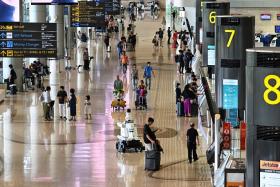Changi to exceed pre-pandemic traffic in 2025: Chee Hong Tat
Transport Minister Chee Hong Tat has expressed confidence that passenger traffic volumes at Changi Airport in 2025 will exceed the levels seen before the Covid-19 pandemic, citing strong growth momentum in the past two months.
Speaking to the media on Dec 3 at his ministry’s office in Alexandra Road in an interview to round up the year, Mr Chee said Singapore’s aviation sector has rebounded well from the impact of the pandemic.
With 165 city links as at December, the airport’s network grew in 2024, Mr Chee noted.
Changi Airport will continue to push for greater connectivity, including with key markets such as China, India and South-east Asia, he added.
Mr Chee said the airport serves about 100 airlines today, and the aim is to grow this further in 2025. He pointed to the increase in daily flights to key cities, such as Jakarta, as another positive sign.
According to the latest statistics, passenger traffic at Changi is on the brink of a full recovery.
Between January and November, about 61.2 million passengers passed through the airport – 98.9 per cent of 2019 levels. In some months, including October and November, passenger numbers exceeded pre-pandemic levels.
A Changi Airport Group spokesperson cited developments such as the visa-free arrangement between China and Singapore, and sustained travel demand in markets such as India, South Korea and the US, as reasons for the steady growth.
The airport also credited airline partnerships for the increase in traffic.
Still, analysts expect Changi’s total traffic volume at the end of 2024 to be shy of the 68.3 million passengers recorded in 2019, even with the year-end holiday travel bump.
Meanwhile, Singapore’s seaport is on track to break several records in 2024, Mr Chee told the media.
He said the port here handled 34.2 million twenty-foot equivalent units of containers between January and October, a 6.2 per cent increase from the same period in 2023 and the highest on record for the first 10 months of a year.
Bunker fuel sales are likely to hit a new high too, with sales volumes rising by 7.5 per cent year on year to 45.7 million tonnes between January and October.
Asked about the impact of ongoing geopolitical tensions, Mr Chee said Singapore’s position as the world’s largest transshipment port has made it easier for it to adapt to shifts in the global supply chain.
Being a trusted place for shipping lines to catch up amid supply-chain snags is another reason the port’s business grew in 2024 despite disruptions such as those in the Red Sea, the minister added.
He said: “If we need to put in more resources, more yard space... (or) we need to open up more berths at Tuas, then we will adjust accordingly because this is a live and dynamic situation.”
Separately, Mr Chee said the Civil Aviation Authority of Singapore (CAAS) will be doing more to facilitate the use of drones here while ensuring safety and security.
As part of a governmental review of rules and processes to ease the burden on businesses, CAAS will relax its regulations on drone activity and the height that drones are allowed to fly at.
Today, they can be flown up to only 200ft (61m) above sea level without a permit.
Any operations above 200ft are allowed only on weekends, subject to CAAS approval.
Mr Chee said this rule has been reviewed after industry feedback. While a permit is still needed for flights above 200ft, CAAS will allow drones to be flown up to 400ft (122m) on all days of the week.
This will increase flexibility for drone operators and reduce labour costs, the minister said.
CAAS is expected to put in a place a “fast-track” approval process for permit applications, reducing the time needed to complete the process from five to three working days. More details will be announced in January.
Get The New Paper on your phone with the free TNP app. Download from the Apple App Store or Google Play Store now


